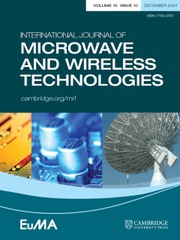No CrossRef data available.
RF sensor dedicated to the dielectric characterization of spheroids between 500 MHz and 20 GHz
Published online by Cambridge University Press: 16 May 2023
Abstract
To achieve better accuracy in their investigations, biologists have recently been using three-dimensional models as intermediates between two-dimensional cell culture and the in vivo study of tissues. Some of these models are based on spheroids, which are cellular aggregates retaining many characteristics of in vivo behaviors while being still easy to use and implement in labs. To study such objects, multiple observation techniques can be used according to the objective of the study, including those using electromagnetic waves as nondestructive, noninvasive, and label-free analysis. Low-frequency (<1 MHz) ones are currently under investigation as electrochemical impedance spectroscopy. However, unlike microwaves (from 300 MHz to 60 GHz), they cannot penetrate the cell. Furthermore, most of the devices dedicated to microwave dielectric characterization are only focusing on cellular scales lower than spheroids (single cell, cell mats, or suspensions) or on tissues and organs. In this article, a microwave spectroscopy device using a coplanar waveguide adapted to the study of spheroids is presented with the dielectric characterization of fixed spheroids, with capacitance and conductance measurements from 0.5 to 20 GHz, aiming at filling the scale gap in the state of the art.
Keywords
Information
- Type
- JNM 2022 Special Issue
- Information
- International Journal of Microwave and Wireless Technologies , Volume 15 , Special Issue 10: JNM 2022 Special Issue , December 2023 , pp. 1643 - 1648
- Copyright
- © The Author(s), 2023. Published by Cambridge University Press in association with the European Microwave Association


